

Lemon thyme is a cute little perennial and a fabulous herb.
Key Lemon thyme facts
Name – Thymus x citriodorus
Family – Lamiaceae
Type – condiment
Height – 8 to 16 inches (20 to 40 cm)
Exposure – full sun
Soil – light, well-drained
Foliage: evergreen – Flowering: spring – Harvest: all year round
Its lilac-colored blossoms and evergreen foliage make it a very ornamental plant all year round.
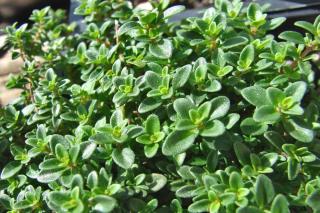 Usually, you’ll find lemon thyme sold in pots or nursery pots.
Usually, you’ll find lemon thyme sold in pots or nursery pots.
The best season to plant these citrus thyme is fall.
If you purchase a young plant in spring, plant it right away, preferably in light and well-draining soil.
Lemon thyme, like its relative common thyme, loves growing in pots. The only word of caution: drainage!
Lemon thyme needs very well-draining soil.
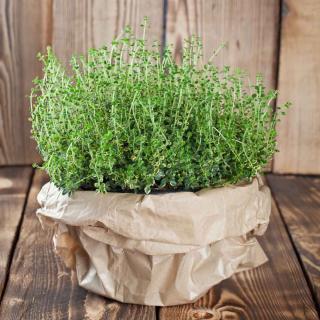 If you have the option, mix bonsai soil with garden soil to ensure a quick-draining substrate.
If you have the option, mix bonsai soil with garden soil to ensure a quick-draining substrate.Since it’s in a pot, you’ll need to fertilize now and then, but only very little, once or twice a year is fine.
To prepare seedlings, you must sow in a nursery in spring.
You can transplant the seedlings in the ground 5 to 6 weeks after sprouting.
Lemon thyme can be propagated through crown division at the beginning of spring.
You can cut stems off your lemon thyme whenever you need some all year round.
It is best to cut stems from recent growth to stimulate appearance of new shoots.
It is best to select the younger stems and collect them in the morning before dawn, which is when flavors are most concentrated.
Help your slow-growing lemon thyme by weeding around it to stifle out competition.
To maintain its dense, compact shape, wait for the end of the blooming season to prune it delicately.
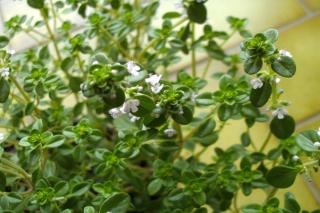 There are two ways to keep it, either leaves are dried, or they are frozen in a freezer.
There are two ways to keep it, either leaves are dried, or they are frozen in a freezer.
In the first case, place collected stems in a dry and ventilated place until they are completely dry. After that, they can be ground and kept in a jar for several months.
Freezing has the advantage of preserving their flavor, and thyme can keep this way for several months.
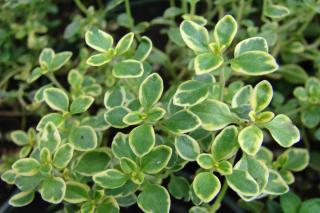 Lemon thyme is a tiny shrub which has leaves that remain very ornamental all year long. Its name comes from its taste that reminisces of lemon.
Lemon thyme is a tiny shrub which has leaves that remain very ornamental all year long. Its name comes from its taste that reminisces of lemon.
It is often used in infusions, and also in cooking to flavor sauces and soups.
Native to the Mediterranean area, lemon thyme is very fragrant and is particularly well suited to seasoning grilled meat and fish.
It is a rather hardy plant that resists temperatures below freezing and diseases very well. Its leaves are wider and rounder than those of common thyme.
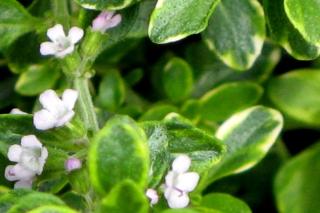 Lemon thyme, like its cousin Thymus officinalis, has certain beneficial medicinal properties, for example it eases digestion and relaxes the body. Some varieties are variegated.
Lemon thyme, like its cousin Thymus officinalis, has certain beneficial medicinal properties, for example it eases digestion and relaxes the body. Some varieties are variegated.
It also helps repel pests in the garden, particularly the cabbage caterpillar. You can also use extracts to silence barking dogs when they’re training (the citrus-like scent distracts them).
No need to water, thyme will be perfectly happy with poor and dry soil. It naturally grows in desolate arid places.